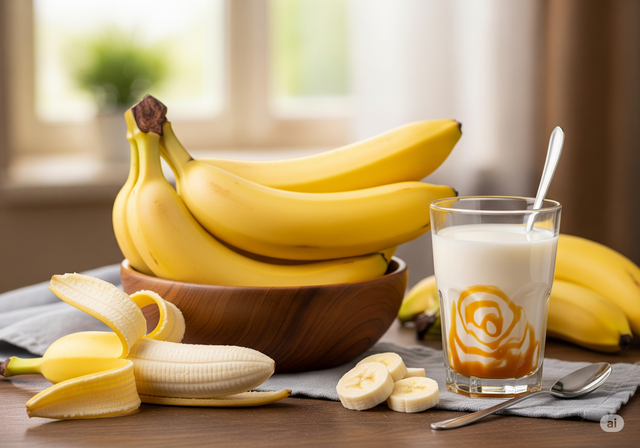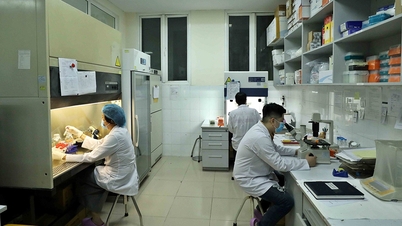Start your day with health news , readers can also read more articles: Lack of sleep, unpredictable effects on the liver!; A glass of orange juice every day: What do experts say?...
Bananas contain many nutrients that are good for health. But what few people know is that combining bananas with certain foods can have a negative impact on the liver.
Bananas are high in sugar and calories. Eating bananas with certain foods can increase blood sugar levels, affect digestion, and interact with other foods. This can lead to increased oxidative stress, inflammation, or fatty liver disease.

People with fatty liver should limit eating ripe bananas and drinking sweetened milk at the same time.
PHOTO: AI
Foods that are often eaten with bananas but can make the liver more susceptible to inflammation include:
Milk. For healthy people, drinking milk and eating bananas at the same time is completely normal. These are foods that contain many nutrients that are beneficial to health, especially for people who exercise at high intensity.
However, if you combine these two dishes into a habit, consuming them in large quantities will cause high blood sugar and excess calories. Eating them for a long time will easily accumulate visceral fat, including the liver. High fat content in the liver will cause fatty liver and increased inflammation.
Cakes and candy. Bananas contain a lot of fructose. Eating bananas with cakes and candy will cause your body to take in a large amount of this sugar. Fructose is absorbed through the small intestine and into the liver.
The liver will metabolize fructose and synthesize it into glycogen. However, the liver only stores about 100-120 grams of glycogen. Excess glycogen will be converted into fat by the liver, increasing the fat ratio in the liver and causing inflammation. The next content of this article will be on the health page on August 20 .
Lack of sleep: Unpredictable effects on the liver!
Growing evidence shows that sleep quality directly affects liver health and metabolic balance.
Experts say that insomnia or sleep disorders not only cause fatigue and reduce work performance, but also impair liver function, especially in people with liver problems such as hepatitis, fatty liver, and cirrhosis.
During sleep, the liver performs many important functions such as detoxification, glycogen storage, bile production, and hormone and metabolism regulation. The liver operates according to a biological clock. If you do not get enough sleep or sleep at the wrong time, this biological rhythm is disrupted, making it impossible for the liver to detoxify effectively when the body needs it.

Insomnia or sleep disorders not only cause fatigue and reduce work performance but also impair liver function.
Photo: AI
Research published in the journal Nutrition & Diabetes shows that sleeping less than 7 hours a day or doing less than 3 hours of physical activity a week can significantly increase the risk of fatty liver - which can progress to cirrhosis or liver cancer. The study, conducted on more than 10,000 people, of whom nearly 4,000 had fatty liver, showed that the poorer the quality of sleep, the higher the risk of the disease, with even a little less sleep increasing the risk of fatty liver by 20%.
However, combining adequate sleep, 7-8 hours/day with moderate to vigorous exercise significantly reduces the risk of disease. According to Dr. Vicente Carreño, President of the Spanish Hepatitis Research Foundation, in addition to controlling blood lipids and blood sugar, improving sleep and increasing exercise should also be prioritized in the treatment and prevention of fatty liver. The next content of this article will be on the health page on August 20.
A glass of orange juice every day: What do the experts say?
Orange juice can provide many health benefits due to its natural vitamin and mineral content.
In particular, vitamin C in orange juice helps strengthen the immune system, fight inflammation and protect cells from free radical damage. Potassium in orange juice helps regulate blood pressure and cardiovascular function. In addition, orange juice contains folate - a substance necessary for cell regeneration, especially important for pregnant women.
This is a nutritious drink that is easy to use every day, but is this good?
Experts warn that overusing orange juice also carries many risks, especially related to sugar and fiber content.

Vitamin C in orange juice helps boost the immune system, fight inflammation and protect cells from free radical damage.
Photo: AI
A 240 ml glass of orange juice contains about 20.8 g of natural sugar and 112 calories. Although this is natural sugar from fruit, the body still processes it similarly to refined sugar. Nutritionist Dolores Woods, from the University of Texas School of Public Health (USA), explains: Even natural sugar, if consumed in large quantities, still creates empty calories and increases blood sugar.
For comparison, a can of soda (340 ml) has about 39 g of sugar, while the same amount of orange juice has 31 g of natural sugar. Although less, orange juice still contributes to a rise in blood sugar.
However, expert Theresa Gentile, working in the US, said that orange juice is still better because it provides vitamin C, potassium and folate, important micronutrients for overall health. Start your day with health news to see more content of this article!
Source: https://thanhnien.vn/ngay-moi-voi-tin-tuc-suc-khoe-muon-gan-khoe-tranh-an-3-mon-nay-voi-chuoi-185250820081010814.htm



![[Photo] Prime Minister Pham Minh Chinh chairs a meeting of the Government Standing Committee to remove obstacles for projects.](https://vphoto.vietnam.vn/thumb/1200x675/vietnam/resource/IMAGE/2025/10/06/1759768638313_dsc-9023-jpg.webp)

![[Photo] Prime Minister Pham Minh Chinh chaired a meeting of the Steering Committee on the arrangement of public service units under ministries, branches and localities.](https://vphoto.vietnam.vn/thumb/1200x675/vietnam/resource/IMAGE/2025/10/06/1759767137532_dsc-8743-jpg.webp)
































































































Comment (0)